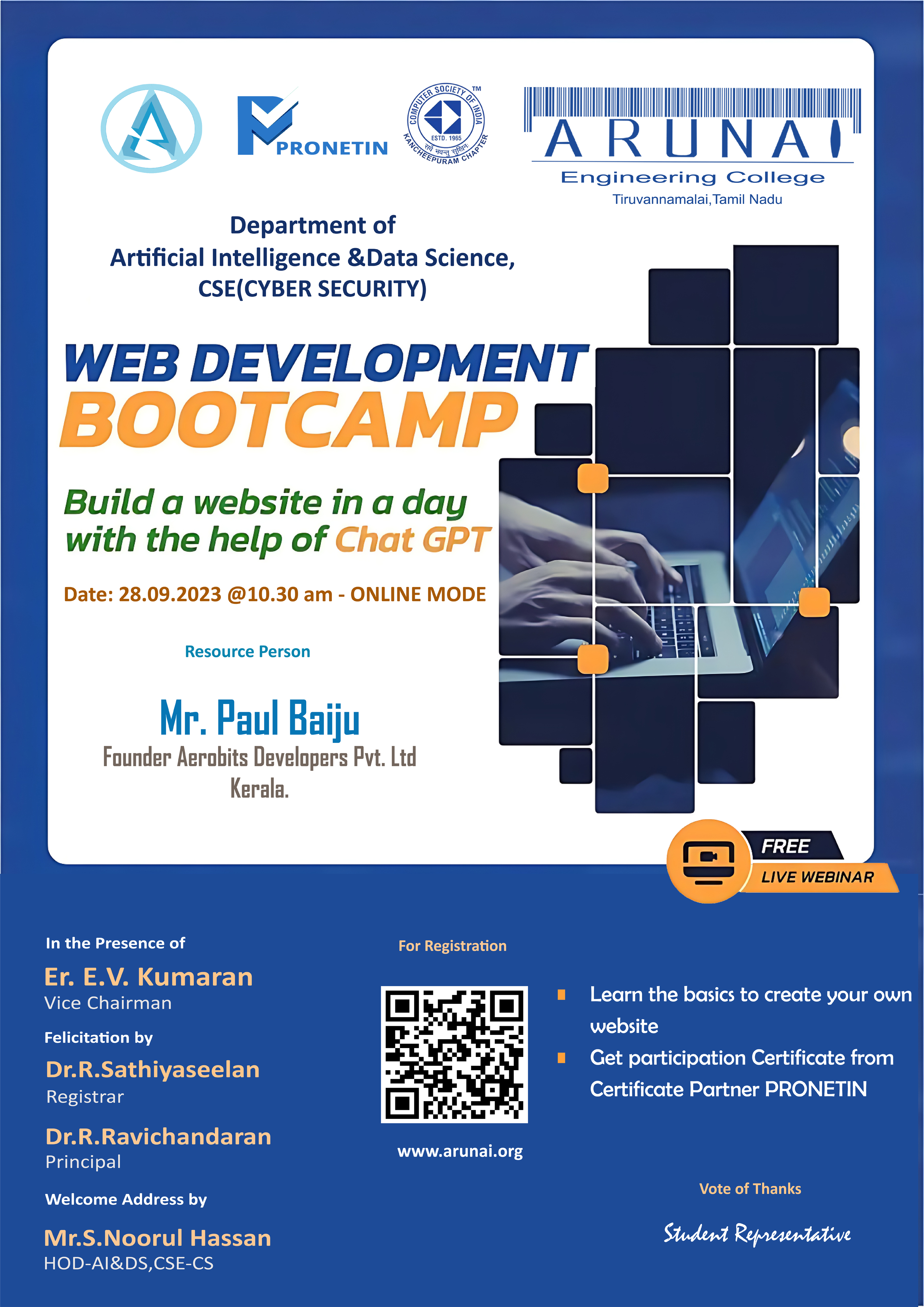
B.Tech- Artificial Intelligence and Data Science
Academics
The Department of Artificial Intelligence and Data Science was established in the year 2022 .The current intake students are 60 for UG Programme. UG Programmes are conducted based on the syllabus prescribed by the Anna University, Chennai. The department is equipped with well qualified and experienced faculty members to improve and enhance the knowledge of the student community. The department has good computing facilities with latest and updated versions of the software. The department conduct periodic workshop, seminar and conferences to help students, research scholars and industries to share a common platform and thereby strengthen the industry institution fusion
Faculty
The department has highly qualified faculty with a blend of academic experience. The faculty helps the students to present papers in different Seminars, Symposium and also encourage the students for these activities.
To provide every student with a strong conceptual foundation in the core areas of Computer Science
To coach students to work in teams and provide insight and direction into the program which imparts an outstanding educational opportunity for those planning to pursue a career or to gain in-depth knowledge in computing technology and research, current trends, developments and analysis.
To be one of the leading department in providing quality Technical Education by developing skillful and knowledged professionals with the state of the art technology and creativity in building AI Tools.
• Developing practically trained skilled professionals to meet the demands of the corporate world.
• Creating an ecosystem of academic excellence through the best possible teaching-learning methodology.
• Grooming professionals with high ethical values and ability to solve real-life problems.
Program Educational Objectives (PEO)
PEO1 : Utilize their proficiencies in the fundamental knowledge of basic sciences, mathematics, Artificial Intelligence, data science and statistics to build systems that require management and analysis of large volumes of data
PEO2 : Advance their technical skills to pursue pioneering research in the field of AI and Data Science and create disruptive and sustainable solutions for the welfare of ecosystems.
PEO3 : Think logically, pursue lifelong learning and collaborate with an ethical attitude in a multidisciplinary team.
PEO4 : Design and model AI based solutions to critical problem domains in the real world
PEO5 : Exhibit innovative thoughts and creative ideas for effective contribution towards economy building
Program Outcomes (POs)
PO1 - Engineering Knowledge: Apply the knowledge of mathematics, science, engineering fundamentals and an engineering specialization to the solution of complex engineering problems.
PO2 - Problem Analysis: Identify, formulate, review research literature, and analyze complex engineering problems reaching substantiated conclusions using first principles of mathematics, natural sciences, and engineering sciences.
PO3 - Design / Development of solutions: Design solutions for complex engineering problems and design system components or processes that meet the specified needs with appropriate consideration for the public health and safety, and the cultural, societal, and environmental considerations.
PO4 - Conduct investigations of complex problems: Use research-based knowledge and research methods including design of experiments, analysis and interpretation of data, and synthesis of the information to provide valid conclusions.
PO5 - Modern tool usage: Create, select, and apply appropriate techniques, resources, and modern engineering and IT tools including prediction and modeling to complex engineering activities with an understanding of the limitations.
PO6 - The engineer and society: Apply reasoning informed by the contextual knowledge to assess societal, health, safety, legal and cultural issues and the consequent responsibilities relevant to the professional engineering practice.
PO7 - Environment and sustainability: Understand the impact of the professional engineering solutions in societal and environmental contexts, and demonstrate the knowledge of, and need for sustainable development.
PO8 - Ethics: Apply ethical principles and commit to professional ethics and responsibilities and norms of the engineering practice.
PO9 - Individual and team work: Function effectively as an individual and as a member or leader in diverse teams, and in multidisciplinary settings.
PO10 - Communication: Communicate effectively on complex engineering activities with the engineering community and with society at large, such as, being able to comprehend and write effective reports and design documentation, make effective presentations, and give and receive clear instructions.
PO11 - Project management and finance: Demonstrate knowledge and understanding of the engineering management principles and apply these to one’s own work, as a member and leader in a team, to manage projects and in multidisciplinary environments.
PO12 - Life-long learning: Recognize the need for and have the preparation and ability to engage in independent and lifelong learning in the broadest context of technological change.
Program Specific Outcomes (PSOs)
PSO1 : Evolve AI based efficient domain specific processes for effective decision making in several domains such as business and governance domains
PSO2 : Arrive at actionable Foresight, Insight, hindsight from data for solving business and engineering problems
PSO3 : Create, select and apply the theoretical knowledge of AI and Data Analytics along with practical industrial tools and techniques to manage and solve wicked societal problems
PSO4 : Develop data analytics and data visualization skills, skills pertaining to knowledge acquisition, knowledge representation and knowledge engineering, and hence be capable of coordinating complex projects
PSO5 : Able to carry out fundamental research to cater the critical needs of the society through cutting edge technologies of AI.






